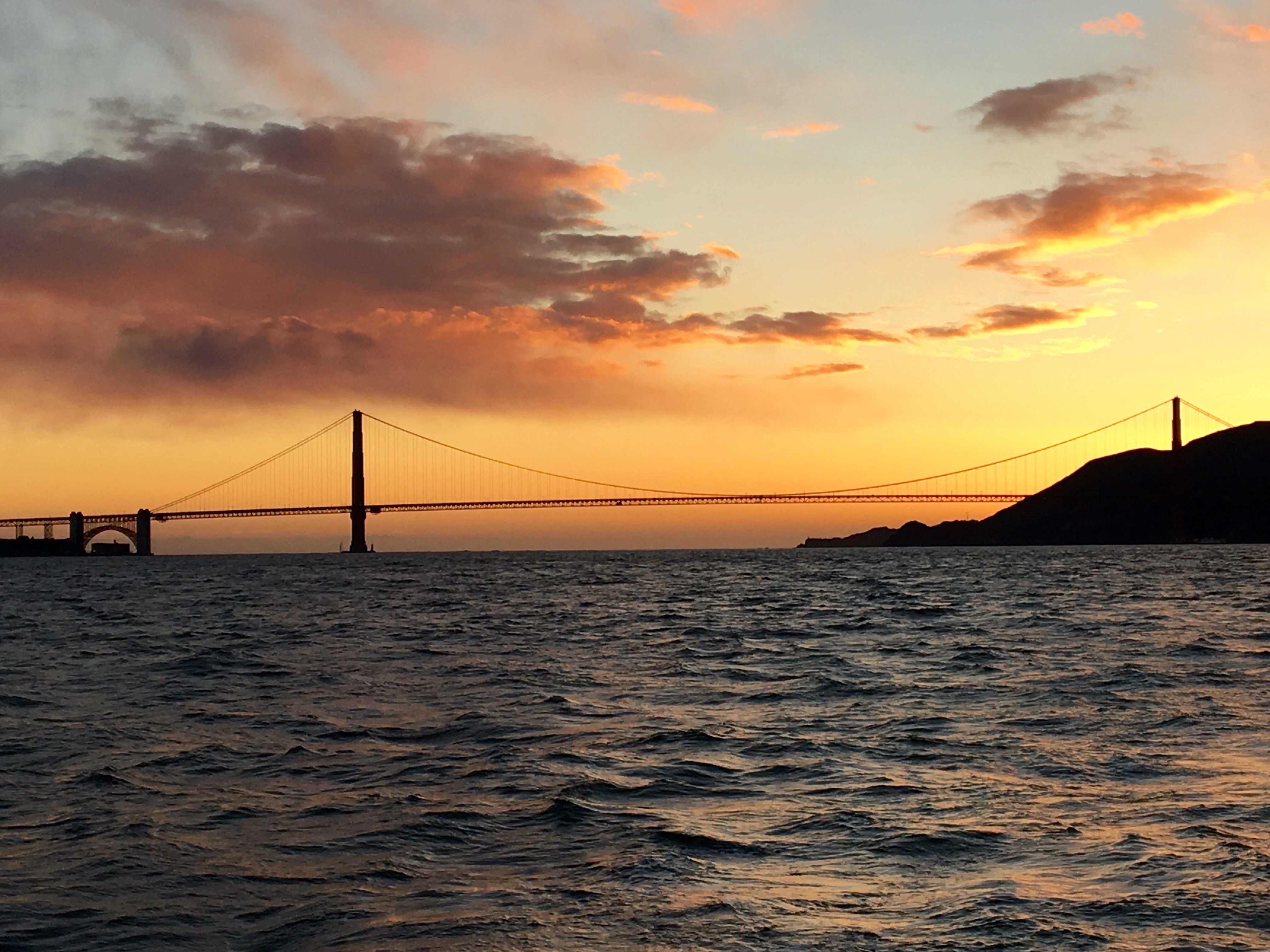
The Global Development Institute held a launch celebration overlooking the Golden Gate Bridge bringing together 45 geographers from 18 different universities. Photo: Kristen Shake
By Aarti Krishnan, PhD researcher
As 8000 geographers, and a smattering of development and politics scientists descended on the streets of San Francisco for the recent Annual American Association of Geographers (the crème de la crème of geography conferences), the air was filled with a sense of intellectual prosperity.
The Global Development Institute was there in full force. We organized 3 sessions, had over 7 presenters, and several staff members who were discussants on numerous panels and sessions (full details below). We presented work on a range of topics from beyond imperialism to inclusive urban cities, from conflict and displacement to remaking the global economy. I heard stories of struggle, inequality, climate vulnerability and conflict, which just reinforced the fact that we live in a fragile and terrifying world. To solve a problem, we must first try to understand it, so I sought to attempt to comprehend the contribution of geography to the broader development debate, especially the Sustainable Development Goals (SDGs). The SGDs, particularly to development specialists are so important because they aim to build a resilient world in the face of this fragility.
Many geographers feel excluded from the SDG process. Some state that the SDGs are not systematic and are essentially a cumulative sum of everything that development stakeholders wanted. A few also believe that many of the goals are discursive and thus may counteract each other leading to paradoxes. So in this scenario – how do different specialties within geography truly engage with development and what role can geographers play?
To answer these questions let me first point out that geography in and by itself encompasses a plethora of specialties including: animal, applied, business, climate, communication, cultural, political, development, disability, economic, energy, environment, ethics, ethnic, information systems, goods and agriculture, education disasters, health, historical, indigenous, polar, regional development, financial geographies – and so on! This goes to show how fluid geography is and how it has grown to become an inter and multi disciplinary subject itself. This has enabled many geographers to engage with the SDGs far more than one would have previously imagined.
Throughout my time at the AAG, I came to understand that geographers aren’t there to reinvent the SDGs. Re-inventing would mean creating new imaginary discursives for SDGs. Instead, geography seeks to comprehend the imaginary that already exists by making sense of complex global and local relations. The way it does this is by providing in-depth rich empirical substance that helps create more informed, progressive critical goals. It narrows and improves scope and legitimizes the work done by grassroots practitioners. Hence, geographers help with the little things, the everyday stories that span several specialities which cumulatively add up to building resilience at macro scales.
My experience has helped me realize that a sense of ‘place’ pervades various specialties of geography. The fact that territoriality provides identity, moving beyond physical borders to shape and reshape communities and countries. It permeates the very meaning of who we are, where we come from and possibility where we go from here. It is then our duty as academics (critical thinkers or radical idealists) to seek to truly understand and make more sustainable this ‘place’ – be it this world, country, community or a person.
I, along with many of my colleagues at GDI have often thought of ourselves as development specialists. However, after my time at the AAG, I ask myself, does development fit into the remit of geography or does geography fit into development? I can no longer draw a clear cut distinction between the two disciplines. So to answer whether we are geographers? The conclusion I have drawn is that there is a little bit of a geographer in all of us!!
Aarti Krishnan won the Economic Geography Specialty Group Best Student Paper award for “Expansion of regional value chains: The case of Kenyan horticulture”, which demonstrates how regional value chains evolve into global value chains in the marketing of agricultural produce.
Global Development Institute presenters:
Uma Kothari: ‘Transnational networks of resistance: contesting colonial rule and the politics of exile’ in a session-titled: Beyond Internationalism II: More-than-national thinking at the twilight of Empire (1850-1950). She also was a discussant for a session on Theorising development in turbulent times and chaired a session on Celbritized aid and advocacy encounters.
Diana Mitlin: ‘Understanding inclusive cities: insights from India’ in a session on Urbanization in South and Southeast Asia.
Luis Perez: ‘Losing Home following Conflict and Displacement’ in a session called Home: Life on the Margins of Home III: Mobility and Belonging.
Matthew Alford: ‘Public and private governance in South African fruit global production networks: complementary, but who benefits?’
Rory Horner: ‘Upgrading within South-South production networks: health and economic dimensions in South Africa’s pharmaceuticals’.
Rachel Alexander: ‘Governance for Sustainability in Global Production Networks: Exploring the Case of UK Retailers Sourcing Cotton Garments from India’.
Aarti Krishnan: ‘What’s the point of environmental upgrading? Comparing Kenyan horticultural farmers supplying different end markets’. She also organised (along with Stefano Ponte from Copenhagen Business School) three sessions within the Remaking the global economy stream with a sub-theme of Global Production Networks and the Environment.
